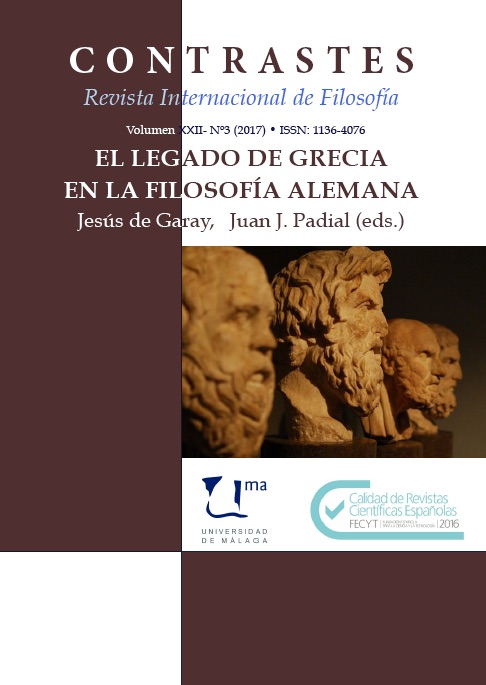Friendship and recognition.On aristotelian philia.What Aristotle saw and Hegel overlooked
DOI:
https://doi.org/10.24310/Contrastescontrastes.v22i3.3755Keywords:
philia, friendship, polis, eudaimonia, spoudaios, virtues, State.Abstract
The Aristotelian definition of man as a political animal (zoon politikon) is not exempt from possible interpretations, including that only within a polis can the human being be happy. From the case of the philia as it appear, above all, in books VIII and IX of Nicomachean Ethics and in relation to the figure of spoudaios that appears also in both books, I propose a ‘political’ reading of Nicomachean Ethics. I understand by ‘political reading’ a conception in which the guiding thread and fundamental motive of ethics is, rather than research into the necessary conditions to attain individual happiness, one concerning with the ideal character of the good man (spoudaios) and of the good citizen. Secondly, I make some parallels between this reading and the Hegelian interpretation of some Aristotelian ideas. I conclude that the omission of a detailed treatment of the philia in Hegel’s ethics-politics implies a fundamental difference in the approach that both authors make of the practical philosophy.
Downloads
Metrics
Publication Facts
Reviewer profiles N/A
Author statements
Indexed in
-
—
- Academic society
- N/A
- Publisher
- Universidad de Málaga
References
AQUINATIS, Thomae, S., In decem libros Ethicorum Aristotelis Ad Nichomachum expositio, Italia: Marietti, 1964.
ARISTÓTELES, Ética a Nicómaco, edición bilingüe y traducción de María Araujo y Julián Marías. Introducción y notas de Julián Marías, Madrid: Centro de Estudios Políticos y Constitucionales, 2014.
Política, edición bilingüe y traducción de Julián Marías y María Araujo. Introducción y notas de Julián Marías, Madrid: Centro de Estudios Políticos y Constitucionales, 2005.
Retórica, introducción, traducción y notas de Alberto Bernabé Pajares, Madrid: Alianza editorial, 2000.
AUBENQUE, P., La prudencia en Aristóteles. Con un apéndice de la prudencia en Kant, Barcelona: Crítica, 1999.
BARKER, E., The Politics of Aristotle, Oxford: Oxford Clarendon Press, 1968.
COOPER, John, M., «Aristotle’s Concept of Friendship» en Essays on Aristotle’s Ethics, ed. A. O. Rorty, Berkeley: University of California Press, 1980, 301-340.
FERRARIN, A., Hegel and Aristotle, New York: Cambridge University Press, 2001.
GOLDSTEIN, Joshua, D., Hegel’s Idea of the Good Life. From Virtue to Freedom, Early Writings and Mature Political Philosophy, Dordrecht: Springer Netherlands, 2006.
HEGEL, G. W. F., Principios de la filosofía del derecho o Derecho natural y ciencia política, Barcelona: Edhasa, 2005.
Escritos de juventud, México: FCE, 1984.
Lecciones de filosofía de la historia, Barcelona: PPU, 1989.
Lecciones sobre la historia de la filosofía (II), México: FCE, 1985.
Fenomenología del Espíritu, (ed. bilingüe), Madrid: Adaba Editores/ UAM Ediciones, 2010.
Enciclopedia de las ciencias filosóficas, Madrid: Alianza Editorial, 1999.
INNERARITY, D., Hegel y el romanticismo, Madrid: Tecnos, 1993.
INWOOD, M., The Blackwell Philosopher Dictionaries. A Hegel Dictionary, Oxford: Blackwell Publishers, 2003.
JAEGER, W., Aristóteles. Bases para la historia de su desarrollo intelectual, México: FCE, 2000.
KONSTAN, D., «Aristotle on Love and Friendship» en ????? vol. II. 2 (2008), 207-212.
PEPERZAK, Adriaan, T., Modern Freedom. Hegel’s legal, Moral and Political Philosophy, Dordrecht-Boston-London: Kluwer Academic Publishers, 2001.
POLO, L., «La amistad en Aristóteles» en Anuario Filosófico 1999 (32), 477-485.
Persona y libertad, Pamplona: Eunsa, 2007.
STRAUSS, L., CROPSEY, J., (eds.) History of Political Philosophy, Chicago: Chicago University Press, 1987.
STRAUSS, L., Natural Right and History, Chicago: Chicago University Press, 1965.
The City and Man, Chicago: Chicago University Press, 1978.
VÁZQUEZ DE PRADA, A., Estudio sobre la amistad, Madrid: Rialp, 1975.
VOEGELIN, E., Order and History (III. Plato and Aristotle), Baton Rouge: Louisiana State University Press, 1957.
La nueva ciencia de la política. Una introducción, Buenos Aires: Katz, 2006.
WIELAND, W., «Norma y situación en la ética aristotélica» en Anuario filosófico 1999 (32), 107-127
WILLIAMS, Robert, R., Tragedy, Recognition, and the Death of God. Studies in Hegel and Nietzsche, Oxford: Oxford University Press, 2012.
ZAGAL, H., Amistad y felicidad en Aristóteles, México: Ariel, 2014.
Downloads
Published
How to Cite
Issue
Section
License
This journal provides immediate free access to its content under the principle of making research freely available to the public. All content published in Contrastes. Revista Internacional de Filosofía, are subject to the Creative Commons Attribution-NonCommercial-ShareAlike 4.0 license whose full text can be found at <http://creativecommons.org/licenses/by-nc-sa/4.0>
It is the responsibility of the authors to obtain the necessary permissions of the images that are subject to copyright.
Authors whose contributions are accepted for publication in this journal will retain the non-exclusive right to use their contributions for academic, research and educational purposes, including self-archiving or repository in open access repositories of any kind.
The electronic edition of this magazine is edited by the Editorial Service of the University of Malaga (Uma Editorial), being necessary to cite the origin in any partial or total reproduction.










5.png)
